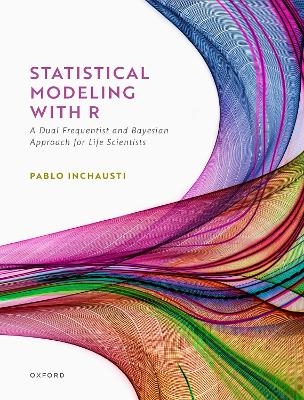
Statistical Modeling With R
a dual frequentist and Bayesian approach for life scientists
Seiten
2022
Oxford University Press (Verlag)
978-0-19-285901-3 (ISBN)
Oxford University Press (Verlag)
978-0-19-285901-3 (ISBN)
An accessible textbook that explains, discusses, and applies both the frequentist and Bayesian theoretical frameworks to fit the different types of statistical models that allow an analysis of the types of data most commonly gathered by life scientists.
To date, statistics has tended to be neatly divided into two theoretical approaches or frameworks: frequentist (or classical) and Bayesian. Scientists typically choose the statistical framework to analyse their data depending on the nature and complexity of the problem, and based on their personal views and prior training on probability and uncertainty. Although textbooks and courses should reflect and anticipate this dual reality, they rarely do so. This accessible textbook explains, discusses, and applies both the frequentist and Bayesian theoretical frameworks to fit the different types of statistical models that allow an analysis of the types of data most commonly gathered by life scientists. It presents the material in an informal, approachable, and progressive manner suitable for readers with only a basic knowledge of calculus and statistics.
Statistical Modeling with R is aimed at senior undergraduate and graduate students, professional researchers, and practitioners throughout the life sciences, seeking to strengthen their understanding of quantitative methods and to apply them successfully to real world scenarios, whether in the fields of ecology, evolution, environmental studies, or computational biology.
To date, statistics has tended to be neatly divided into two theoretical approaches or frameworks: frequentist (or classical) and Bayesian. Scientists typically choose the statistical framework to analyse their data depending on the nature and complexity of the problem, and based on their personal views and prior training on probability and uncertainty. Although textbooks and courses should reflect and anticipate this dual reality, they rarely do so. This accessible textbook explains, discusses, and applies both the frequentist and Bayesian theoretical frameworks to fit the different types of statistical models that allow an analysis of the types of data most commonly gathered by life scientists. It presents the material in an informal, approachable, and progressive manner suitable for readers with only a basic knowledge of calculus and statistics.
Statistical Modeling with R is aimed at senior undergraduate and graduate students, professional researchers, and practitioners throughout the life sciences, seeking to strengthen their understanding of quantitative methods and to apply them successfully to real world scenarios, whether in the fields of ecology, evolution, environmental studies, or computational biology.
Pablo Inchausti is Professor of Ecology at the Universidad de la República, Centro Universitario Regional del Este, Uruguay. He is the co-editor of the influential and highly-cited book Biodiversity and Ecosystem Functioning: synthesis and perspectives (OUP, 2002) and has been successfully teaching statistics and mathematical modelling to students of the life and social sciences for over 15 years.
| Erscheinungsdatum | 10.01.2023 |
|---|---|
| Verlagsort | Oxford |
| Sprache | englisch |
| Maße | 253 x 194 mm |
| Gewicht | 1214 g |
| Themenwelt | Mathematik / Informatik ► Informatik ► Datenbanken |
| Mathematik / Informatik ► Mathematik ► Angewandte Mathematik | |
| Mathematik / Informatik ► Mathematik ► Statistik | |
| ISBN-10 | 0-19-285901-3 / 0192859013 |
| ISBN-13 | 978-0-19-285901-3 / 9780192859013 |
| Zustand | Neuware |
| Informationen gemäß Produktsicherheitsverordnung (GPSR) | |
| Haben Sie eine Frage zum Produkt? |
Mehr entdecken
aus dem Bereich
aus dem Bereich
Einführung in die Praxis der Datenbankentwicklung für Ausbildung, …
Buch | Softcover (2021)
Springer Fachmedien Wiesbaden GmbH (Verlag)
CHF 69,95


